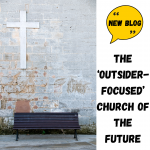To many this may seem a very obvious question, but I believe it is still worth exploring.
Looking at the benefits for Churches of instigating energy efficiency measures on a short, medium and long-term basis:
- In the short-term, energy efficiency measures will save money that can be spent on other church projects.
- In the medium-term, congregations who have embraced energy efficiency, and other green practices, can become educators and leaders within their wider local communities, showing the way, and taking a responsible approach, to tackling climate change.
- In the long-term, environmentally responsible good-practices will help to reduce the carbon footprint of church buildings and will make a positive contribution to tackling climate change.
For more than a decade Faith Communities around Australia have acknowledged that climate change may have a detrimental impact on our planet. In 2006 a book entitled Common Belief – Australia’s Faith Communities on Climate Change was published by The Climate Institute (http://www.climateinstitute.org.au/verve/_resources/commonbelief.pdf). In this book all of the major Faith Communities provided contributions focusing on their beliefs regarding the morality and spirituality of climate change.
It is well recognised that the millennial generation (individuals born between 1981 and 1996) care deeply about climate change. They will experience its effects at first hand within their lifetimes and they know that climate change will significantly impact the lives of their children and grandchildren. Millennials want to make a difference to the world around them and will migrate towards those who share their core values and who are taking action in support of those values. If churches are to encourage this and future generations of families to attend their places of worship acting to reduce the carbon footprint of faith buildings will send a positive message of encouragement.
…and would encourage everyone to do just that. Raising awareness and acceptance of the issue of climate change will influence how we all behave. It will develop an attitude of joint accountability and encourage us all to take steps in how we live our lives that will make the lives of future generations healthier and safer. Talking about reducing our carbon footprint is the most important thing we can do for Creation Care.





